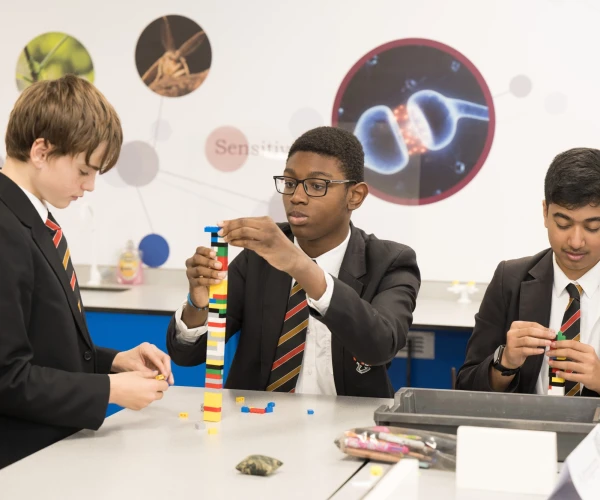- Whole School Curriculum
- Faculties and Subject Curriculum
- Art & Design faculty
- Business, Economics and Psychology faculty
- Careers and Personal Development faculty
- Personal Development – The Big Picture
- Skills Builder
- Careers Education and Guidance
- Quality in Careers Standard Award
- Careers Advice
- Careers Fair
- Information for Parents and Carers
- Careers Websites and Further Information for students
- HGS and the Careers & Enterprise Co.
- Work Experience
- Careers Education Provider Access Policy (Baker clause)
- National Careers Week
- Careers in Focus
- English faculty
- EPQ
- Humanities faculty
- Languages faculty
- Learning Support faculty
- Mathematics & Computing faculty
- PE and Sport faculty
- Performing Arts faculty
- Science faculty
- Assessment
- Extra curricular
- Remote learning
- Year 9 options
Pyschology
Overall Psychology Intent:
- Psychology at HGS offers students an engaging and stimulating introduction to the discipline, combined with the academic integrity and skills that Higher Education and employers value.
- Students develop a range of valuable skills, including critical analysis, independent thinking, and research. These skills are particularly relevant to young people and are transferable to further study and the workplace. They gain insight into the mind, brain, and human behaviour to understand the diversity of psychological functioning and its significance, helping us to be tolerant and empathetic global citizens.
- Through the development of these skills HGS psychologists will have the confidence and capacity to challenge perceived wisdom and structure an argument in an analytical manner.
Key strengths in the curriculum
Psychology at HGS follows the AQA specification for A level.
- At the start of each year students are exposed to the fundamentals of conducting research, the application of science to psychology and wider issues in psychology, including approaches and issues and debates. This builds incrementally through the course and all new material is explicitly linked back to it. These core topics are interleaved throughout and feed into all topic areas.
- Literacy is explicitly taught with a particular focus on specialist terminology relevant to different topics and themes, enabling fluency in the language of psychology.
- Students are given the opportunity to write in analytically and critically whilst presenting and debating verbally. This writing is modelled and scaffolded successfully with students becoming increasingly independent as the curriculum progresses.
- Diversity is considered in all aspects of the course through discussions on gender bias, culture bias, neurodiversity and also examples used in lessons that avoid being overly heteronormative.
- Students have the opportunity to design, conduct and report on their own psychological investigations.
Golden thread themes include – features of science; approaches in psychology; issues and debates in psychology including reductionism and determinism.
Key strengths within Psychology
- Teacher Subject Knowledge
- Questioning – targeted for challenge and support.
- Careful modelling
- Explicit focus on literacy and vocabulary
- Teacher explanation
- Organisation of resources
REACH values in Psychology
|
RESPECT in Psychology means… |
A deep understanding of processes underpinning diversity, on a biological, psychological and social level. An understanding of the universality of human experience. Respecting the personal experience of those with mental health issues |
|---|---|
|
EXCELLENCE in Psychology means… |
Thinking and speaking scientifically and critically, having the skills and knowledge to design and analyse research designs. Having the depth & breadth of knowledge to create links and apply knowledge synoptically, whilst having a fluent grasp of terminology. Ability to discuss ideas thoroughly & effectively. |
|
ADVENTURE in Psychology means… |
Theory construction, whilst having the tools to deduce hypotheses and the ability to design research to test them. Asking interesting ‘what if?’ questions in response to experimental findings. Looking for examples of psychological concepts in everyday life. Exploring psychological quirks, such as the limits of our memory or our tendency to conform and obey. |
|
COMMITMENT in Psychology means… |
Commitment to understanding complex ideas and skills from a range of disciplines, such as biology, English and maths. Understanding that each new topic requires knowledge from previous topics, and committing to find those links. Willing and able to respond to feedback and redraft accordingly. Commitment to completing pre-reading tasks consistently. Being able to challenge oneself with differentiated tasks. |
|
HONESTY in Psychology means… |
Recognising one’s own biases and the biases inherent in psychological investigations. Honesty in seeing the flaws in research, even the studies that we enjoy or agree with. Be able to give balanced & well-structured answers. Honesty with oneself about what work needs to be done. |
Curriculum overviews
Psychology – Years 12 & 13(pdf)
Created November 2022Permalink
- Whole School Curriculum
- Faculties and Subject Curriculum
- Art & Design faculty
- Business, Economics and Psychology faculty
- Careers and Personal Development faculty
- Personal Development – The Big Picture
- Skills Builder
- Careers Education and Guidance
- Quality in Careers Standard Award
- Careers Advice
- Careers Fair
- Information for Parents and Carers
- Careers Websites and Further Information for students
- HGS and the Careers & Enterprise Co.
- Work Experience
- Careers Education Provider Access Policy (Baker clause)
- National Careers Week
- Careers in Focus
- English faculty
- EPQ
- Humanities faculty
- Languages faculty
- Learning Support faculty
- Mathematics & Computing faculty
- PE and Sport faculty
- Performing Arts faculty
- Science faculty
- Assessment
- Extra curricular
- Remote learning
- Year 9 options











